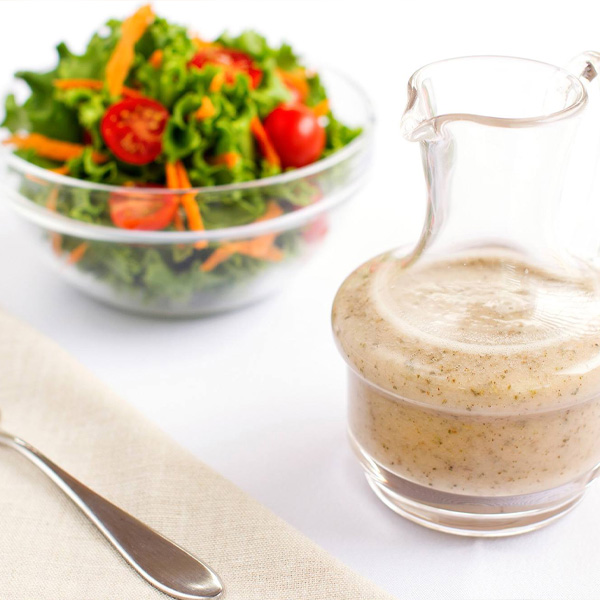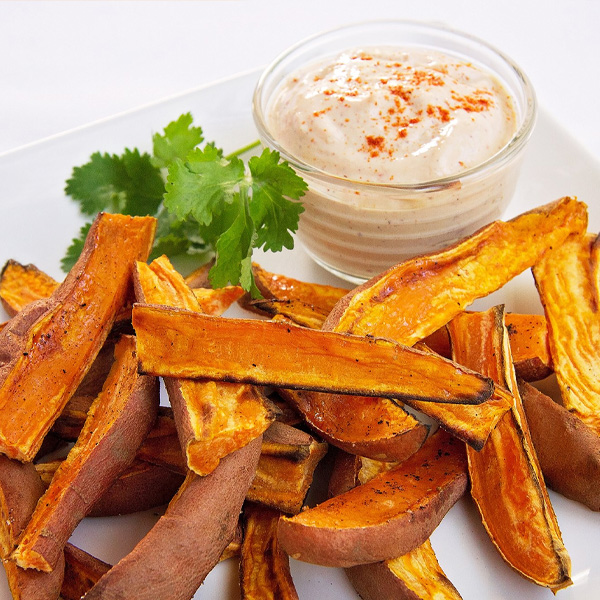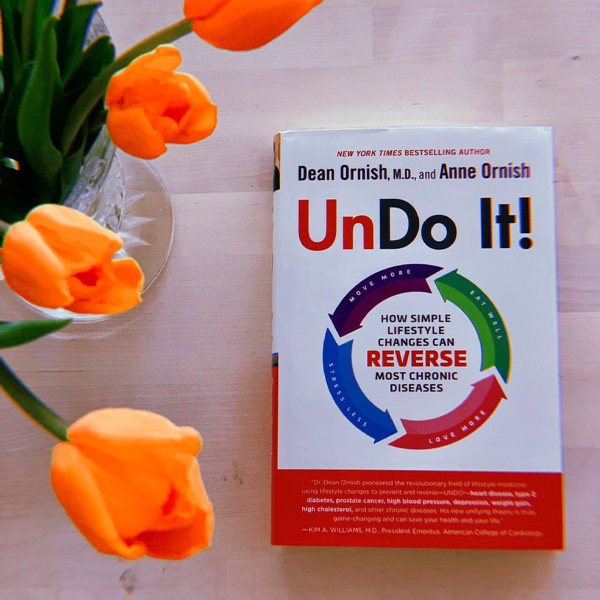Ornish Diet Review
Table of Contents
About Ornish Diet
The Ornish Diet is a low-fat nutrition plan created by Dr. Dean Ornish, a clinical professor of medicine at the University of California, San Francisco.
This diet, along with the three pillars of love and support, regular exercise, and stress management, is meant to be a preventative approach to reversing heart disease[1] and achieving sustainable weight loss.
In contrast to the trendy diets like keto and paleo with a focus on high amounts of fats and animal protein, the evidence-based Ornish Diet is essentially a modified vegan diet.
With over 68k followers on Facebook, the Ornish Diet has been featured on media outlets such as Good Morning America, The Dr. OZ Show, Super Soul Sunday, and The Ellen Show.
This Ornish Diet review will take an in-depth look at this diet plan, its restrictions, how it works, how it affects weight loss, and much more.
Overview of Ornish Diet
Ornish Lifestyle Medicine is considered a revolutionary program, helping millions of people learn how to feel and live better while preventing disease. Ornish Diet is designed to teach you how to eat a clean diet that supports your health in the long run.
Dr. Dean Ornish is the founder of the nonprofit Preventive Medicine Research Institute. This organization has been on a mission to provide the highest quality scientific research and education on the power of lifestyle changes since 1984 with the main goal to manage degenerative diseases prevalent in today’s world.
Dr. Ornish does not believe in fads, taking an all-or-nothing approach towards health. On his Lifestyle Medicine program, the Ornish reversal diet protocol introduces you to “The Spectrum” which is his latest nutrition plan for weight loss, diabetes, prostate cancer, and heart disease.
On the Spectrum, the focus is not always on food but it is also on how and when you eat food. The food groups are categorized from the healthiest, mostly fruits and vegetables, whole grains, legumes, soy products, and nonfat dairy, to the least healthy, such as refined carbs and sugar-loaded processed and packaged foods.
Based on the Ornish Diet, users have a spectrum of options available to them to make informed decisions. Anyone who follows the Ornish Diet is encouraged to eat more healthy foods especially if they want to stop the progression of chronic disease.
Ready to find out more about how it works? This Ornish Diet review will get to the details of the diet in just a few scrolls. Before we get there, have a peek at the highlights of this plan to get a feel for what’s in store.
Highlights
- Science-based, disease-preventing, and weight loss-promoting
- Plant-based
- Loaded with proper servings based on the USDA dietary guidelines[2]
- Sodium is limited
- Encourages reduced consumption of refined carbohydrates, sugars, caffeine, and alcohol
- Scientifically proven to reverse the progression of high cholesterol levels[3], type 2 diabetes[4], and high blood pressure[5]
- Increased fruits and vegetables give[6] the body more vitamins, minerals, and beneficial plant chemicals
- Encourages stress management techniques and regular exercise
- Go at your own pace
- Integrative medicine programs may be covered by some insurance companies
Ornish Diet Review
There is no right or wrong with the Ornish Diet, depending on the goal you would like to achieve, you can decide how deep you want to dive into this plan.
If your goal is to lose a few pounds, feel healthier than your current state, and get a general energy boost, you can ease into the diet plan, but if the main purpose for following the Ornish Diet is for you to reverse the complications of diabetes, Alzheimer’s, or heart disease, you will need to take the recommendations more seriously.
Now, what is the Ornish Diet exactly? For you to get an idea of what Dr. Ornish means by the spectrum, here’s how you can navigate through this diet:
The main rule is to switch up all refined carbohydrates such as white bread, cookies, biscuits, crackers, doughs, and pasta with whole-grain alternatives like bread, pasta, cookies, and crackers made with whole grains like quinoa, and brown rice.
You will get your healthy carbs in the form of fruits, vegetables, whole grains, and legumes every chance you get since they are rich in hundreds of nutrients supportive of your well-being.
You are also encouraged to avoid all kinds of saturated fat[7] by limiting most animal products and processed foods such as burgers, sausages, bacon, pastries, ice cream, etc.
Dr. Ornish believes the consumption of animal proteins and saturated fats to be one of the main factors in speeding up the aging process and the occurrence of heart disease. On the other hand, according to this study[8], he emphasizes the beneficial effects of fish oil in reducing the risks of dying from heart attacks and cardiovascular diseases.
According to U.S. News & World Report, the Ornish Diet has made it to the top spot as the best
heart-healthy diet for eleven consecutive years, and it has been ranked as #4 among the best plant-based diets. But what kind of meals will you be eating on this diet?
If you have a hard time finding Ornish Diet recipes that are not complicated to make and will support you along your healing journey, look no further than the Everyday Cooking with Dr. Dean Ornish book to access 150 easy recipes that meet all the Ornish Diet guidelines.
The Ornish Diet is best known for introducing people to a new plan geared toward reversing heart disease and it is successful in helping people achieve their goals by restricting foods that damage the heart and brain over time.
If you follow this diet for the same goal, bear in mind that it completely restricts total and saturated fats, in addition to foods containing cholesterol or refined carbs and oils.
Here are some examples of meals you can have on this diet:
Breakfast
- Vegetable egg white omelet or scramble with whole-grain bread
- Blueberries, strawberries, and raspberries with nonfat yogurt
- Apple-spiced oatmeal
- Whole grain cinnamon french toast with fruits and yogurt topping
Lunch
- Curry sweet potato soup with no oil
- Vegetarian chili with no oil
- Vegetable soup with no oil
- Salad topped with five grilled shrimp
Snack
- Dark chocolate
- Green pea guacamole
- Red grapes
- 3 apricots
- Greek yogurt parfait
- Garden greens smoothie
Dinner
- Tofu and vegetable stir-fry
- Wild salmon
- Meatless tacos
- Rice and beans
- Fennel and arugula salad with vinaigrette
- Whole-wheat penne pasta with roasted vegetables
A few servings of certain[9] nuts and seeds are allowed on the Ornish Diet. Nuts such as almonds and peanuts are rich in unsaturated fats and walnuts specifically provide a great source of heart-healthy Omega-3s[10].
Studies show that seeds like flaxseeds[11], sunflower, and pumpkin seeds[11] are high in antioxidants[12] and plant compounds[13] with heart-healthy protective benefits.
Based on the Ornish Diet, each day you are allowed to include 2-3 servings of low-fat foods or nuts in your meals.
Now that you have a better understanding of the diet plan in this Ornish Diet review, I will let you know who can follow the plan and how it helps you.
Who Is Ornish Diet For?
The Ornish Diet is an anti-aging and anti-inflammatory nutrition protocol that is suitable for people who are willing to give up animal meat and high-fat foods. This lacto-ovo-vegetarian diet plan emphasizes switching up some eating habits, like eating large amounts of nuts and seeds or full-fat dairy to achieve the best results.
If you are ready to gradually transition to a vegetarian or vegan diet to kickstart your body’s healing process, the Ornish eating guidelines fully support you along this path. Its scientifically researched method teaches you to choose your ingredients more mindfully and build healthier eating habits in the long run.
What Are The Benefits Of The Ornish Diet?
The Ornish Diet is marketed as a program that can help you lose those extra pounds and reverse chronic conditions such as heart disease, diabetes, and prostate cancer. Dr. Ornish believes that when clean eating habits fall into place, and you gradually get used to eating on this delicious and nutritious plan, you will feel better.
When you make an effort to join the Ornish Diet community and take advantage of their educational resources, you’ll learn how to eat well, lower your stress levels, exercise, and find emotional or social support in your life. As a result, not only you will feel lighter but you can improve your health in different areas of your life dramatically.
How Does Ornish Diet Work?
If you are living with a chronic disease, the Ornish Diet’s unique approach to nutrition can have several great outcomes like having more plant foods, fiber, probiotics, and having less refined oils, refined carbohydrates, and sugars.
The Ornish Diet does not restrict your caloric intake however it draws your attention towards making smarter food choices. While carbohydrates and protein have 4 calories per gram, fat has 9 which is why, on the Ornish Diet, you limit certain high-fat foods and you have fewer calories throughout your day resulting in quicker weight loss.
It also helps you maintain heart health because you tend to eat less inflammatory and damaging fats from animal meats. If you lower your fat intake and eat mostly fresh fruits, vegetables, and only whole grains, weight loss is more likely to happen at a faster pace.
In addition, the Ornish Diet suggests ways to manage and reduce your stress levels which is one of the main causes of mindless overeating. We all know that feelings of anxiety, anger, or frustration usually are linked to intensive cravings and bad eating choices.
The Ornish Diet emphasizes the importance of things like yoga or meditation to control stress and improve your sleep, as well as spending quality time with friends and loved ones for a sense of joy and belonging.
For more guidance, Ornish has a few books, including The Spectrum, where you can find nutrition, exercise, stress management, and emotional support techniques as a guide toward a healthier version of yourself.
Undo It! is also another resource book Dr. Ornish wrote about making adjustments in your diet and lifestyle to combat conditions like breast and prostate cancers, Type 2 diabetes, and chronic heart conditions.
What Are The Ingredients In The Ornish Diet?
On the Ornish Diet, you exclude “empty calorie” foods such as processed white flour and sweeteners, but more importantly, you include as many nutrient-rich foods[14] as you can in your life. The healthy fruits and vegetables, plant-based proteins, and whole grains that you eat more of will provide your body with the essential macro and micronutrients you need.
Most of your carbohydrate comes from plants in their unprocessed form. Only 4g of fat is allowed which comes from sources such as flaxseed oil, fish oil, nuts, seeds, and vegetarian plankton-based Omega-3[15] fatty acids.
The protein sources are mostly plants and come from foods like legumes, tofu, tempeh, beans, and a few animal products such as egg whites, non-fat yogurt, and cheese.
To add flavor to your meals, the Ornish Diet recommends using flavor-enhancing lemon juice, vinegar, or herbs and spices specifically for those with heart conditions who are recommended to watch their sodium consumption.
When it comes to stimulants such as caffeine, the Ornish Diet educates people on the benefits of reduced caffeine consumption for a calmer and more relaxed state of mind. However, there have been numerous studies that support the health-promoting effects of the phytonutrients contained in coffee[16] and black[17] or green tea[18].
With any caffeine-containing[19] food or drink the consumption needs to be limited to one or two cups per day, to reap the antioxidant benefits of the natural plant compounds in coffee beans and tea leaves. Note that Dr. Ornish does not encourage those who suffer from heart palpitations[20], arrhythmias[21], anxiety, or acid reflux[22] to drink caffeinated beverages.
Next, my Ornish Diet review will let you know of any possible side effects.
Ornish Diet Side Effects
Like any diet, when you start you need to be careful and take all aspects of your new nutrition plan into consideration.
With the Ornish Diet, the fats and animal proteins are restricted, so if you don’t plan wisely, this diet may lead to some nutrient deficiencies, such as iron[23] and B12[24].
People may also find that, since they don’t get enough proteins and fats on this diet they don’t feel satiated or get hungry quickly. Depending on the foods you choose, your diet may feel not filling enough in the long term.
While writing this Ornish Diet review I also found that the consumption of most fats and unsalted nuts, seeds, and nut butters are restricted on this diet.
The reason for that is that nuts contain more[25] Omega-6 fatty acids compared to Omega-3s. But on plant-based diets, play a huge role in keeping you full and they also contain other healthy nutrients.
Limiting fats severely not only can affect your skin and cell function, but it may also result in feeling unsatisfied which can lead to having trouble sticking to this diet. In addition, nursing or pregnant women shouldn’t follow the Ornish Diet as it is too low in fats and other nutrients like iron.
The diet is not suitable for children and teenagers either, due to the mentioned shortcomings. Always consult with your doctor to make sure following this diet plan won’t cause further health problems in your body.
Ornish Diet Reviews: What Do Customers Think?
According to the U.S. News & World Report experts reviews section, the Ornish Diet has an overall score of 3.5/5 stars. Note that this ranking is based on reviews from diabetes and heart specialists, diet experts, and nutritionists.
The functionality of this diet was evaluated in seven categories:
- Ease: 1.9/5
- Effectiveness in managing diabetes: 3.2/5
- Effectiveness in managing heart disease: 4.3/5
- Safety: 4.1/5
- Nutritional guidelines: 4/5
- Long-term weight loss: 3/5
- Short-term weight loss: 3.4/5
There is so much praise about the Ornish Diet from people who have gotten their health and life back thanks to its protocols. To help you decide whether becoming a member of the Ornish community is the solution you need, I uncovered a few inspiring reviews from clients on the Ornish Living section of their website.
A 58-year-old happy participant who was suffering from diabetes, coronary heart disease, and high blood pressure wrote:
“Now, my change in lifestyle through Ornish Lifestyle Medicine has changed my diabetes to medicine only (no insulin), and I lost 24 lbs. I would highly recommend this program to those who want to change their life for the better.”
Another participant who was previously diagnosed with Type 2 Diabetes, had a heart attack, and two bypass surgeries wrote:
“Being able to spend more meaningful time with my family means a lot to me. I couldn’t have done that without the Ornish Lifestyle Medicine Program. I’ve lost 12 pounds, reduced my medications, and most importantly, feel a lot, lot better.”
On the Ornish website, I also found another inspiring story from a patient who needed a heart transplant and was told by his doctor that the survival rate is only 11 years. He tried to change his lifestyle and eating habits over 9 weeks, and his heart transplant was suspended.
After trying the diet, he said: “Now, I’m doing long hikes and exercising and having fun. My heart function has improved drastically in just 2 months, and the doctors no longer believe that a heart transplant is the right course of action for me. I have hope again; it’s amazing.”
Overall, Ornish Diet reviews show how satisfied people are with this diet plan.
Is Ornish Diet Worth It?
If you are someone who is looking to reverse aging, lose some weight, or maintain a healthy weight, this might be worth trying out. The Ornish Diet is not a customized or personalized diet plan, but it includes great guidelines to keep you in good shape. If you learn how to plan and commit to finding the right recipes, you are more likely to stick to this way of eating.
Restricting most fats, even the healthy ones such as coconut, olives, unsalted nuts or avocados can limit your intake of other necessary nutrients. Your body also needs sufficient fats to absorb fat-soluble vitamins[26] like A, D, E, and K.
So, this Ornish Diet review suggests having things in moderation when it comes to making changes in your life and following a new diet.
Ornish Diet Promotions & Discounts
At the time of this Ornish Diet review I did not find any promotions on the membership or books.
The Preventive Medicine Research Institute and the Ornish program are committed to finding new ways through which more people have access to more affordable health care, and this review found that the program can be covered by some insurance policies in the US.
By signing up for the Ornish Program newsletter, you will get access to educational material and you will be able to ask your questions and get inspired by other people’s success stories with Ornish Diet.
Where to Buy Ornish Diet
To learn more about the Ornish Lifestyle medicine program and the Ornish Diet you can find several resources, articles, recipes, and studies on the Ornish website.
There are also two main books offered by the Ornish program, The Spectrum, and UnDo It to support the clients with extra information, recipes, and guidelines on Amazon. The two books are available for $22 and $18, respectively.
FAQ
Is Ornish Diet vegan?
Dr. Ornish focuses on consuming a diet high in fruits and vegetables but his diet is not 100% vegan, as it includes foods like low-fat dairy and egg whites.
Is Ornish Diet gluten-free?
Ornish Diet does not exclude glutinous grains[27] and emphasized getting sufficient amounts of whole grains. However, you can always modify your plan and substitute whole grains such as wheat, and rye in your diet with gluten-free options like buckwheat[28], amaranth[29], and quinoa[30] as needed.
What are the supplement facts of the Ornish Diet?
Since this is a diet plan full of different foods, there are no supplement facts.
How to Contact Ornish Diet
If you would like to contact someone about the Ornish Program, you can reach out to them using the following ways:
- Phone: 877-888-3091
- Online Contact Form
Check out similar reviews you might like:
Article Sources
- Dansinger, M. L., Gleason, J. A., Griffith, J. L., Selker, H. P., & Schaefer, E. J. Comparison of the Atkins, Ornish, Weight Watchers, and Zone diets for weight loss and heart disease risk reduction: a randomized trial U.S. National Library of Medicine JAMA, 293(1), 43–53
- USDA Dietary Guidelines for Americans USDA
- Ben Brown, MD What is the Difference Between the Cholesterol We Make and the Cholesterol We Eat? Ornish Lifestyle Medicine
- Dean Ornish, MD What’s the Best Way for Diabetics to Follow Your Program? Ornish Lifestyle Medicine
- Carra Richling Sodium and Potassium: A Delicate Heart-Healthy Balance Ornish Lifestyle Medicine
- Havard School of Public Health Vegetables and Fruits Havard School of Public Health, The Nutrition Source
- Havard School of Public Health, The Nutrition Source Types of Fat
- Penny M. Kris-Etherton, William S. Harris, Lawrence J. Appel and and for the Nutrition Committee Fish Consumption, Fish Oil, Omega-3 Fatty Acids, and Cardiovascular Disease Circulation. 2002;106:2747–2757
- Monica H.Carlsen, Bente Lise Halvorsen, Rune Blomhoff Chapter 6 - Antioxidants in Nuts and Seeds ScienceDirect Nuts and Seeds in Health and Disease Prevention 2011, Pages 55-64
- Ashish Chaddha and Kim A. Eagle Omega-3 Fatty Acids and Heart Health Circulation. 2015;132:e350–e352
- Ros, E., & Hu, F. B. Consumption of plant seeds and cardiovascular health: epidemiological and clinical trial evidence U.S. National Library of Medicine Circulation, 128(5), 553–565
- Padilla, F. C., Rincón, A. M., & Bou-Rached, L. Contenido de polifenoles y actividad antioxidante de varias semillas y nueces [Polyphenol content and antioxidant activity of several seeds and nuts] U.S. National Library of Medicine Archivos latinoamericanos de nutricion, 58(3), 303–308.
- Hussain, T., Tan, B., Yin, Y., Blachier, F., Tossou, M. C., & Rahu, N. Oxidative Stress and Inflammation: What Polyphenols Can Do for Us? U.S. National Library of Medicine Oxidative medicine and cellular longevity, 2016, 7432797
- Havard School of Public Health Following a variety of healthy eating patterns associated with lower heart disease risk Havard School of Public Health, News
- Omega-Research.com Plant-Based Omegas. Algal EPA - DHA Omega-Research.com
- Havard School of Public Health Is coffee good or bad for your health? Havard School of Public Health, News
- Rasheed Z. Molecular evidences of health benefits of drinking black tea U.S. National Library of Medicine International journal of health sciences, 13(3), 1–3
- Yi, M., Wu, X., Zhuang, W., Xia, L., Chen, Y., Zhao, R., Wan, Q., Du, L., & Zhou, Y. Tea Consumption and Health Outcomes: Umbrella Review of Meta-Analyses of Observational Studies in Humans U.S. National Library of Medicine Molecular nutrition & food research, 63(16), e1900389
- Cappelletti, S., Piacentino, D., Sani, G., & Aromatario, M. Caffeine: cognitive and physical performance enhancer or psychoactive drug? U.S. National Library of Medicine Current neuropharmacology, 13(1), 71–88
- Myers M. G. Caffeine and cardiac arrhythmias U.S. National Library of Medicine Annals of internal medicine, 114(2), 147–150
- Klatsky, A. L., Hasan, A. S., Armstrong, M. A., Udaltsova, N., & Morton, C. Coffee, caffeine, and risk of hospitalization for arrhythmias U.S. National Library of Medicine The Permanente journal, 15(3), 19–25
- Wendl, B., Pfeiffer, A., Pehl, C., Schmidt, T., & Kaess, H. Effect of decaffeination of coffee or tea on gastro-oesophageal reflux U.S. National Library of Medicine Alimentary pharmacology & therapeutics, 8(3), 283–287
- Pawlak, R., Berger, J., & Hines, I. Iron Status of Vegetarian Adults: A Review of Literature U.S. National Library of Medicine American journal of lifestyle medicine, 12(6), 486–498
- Pawlak, R., Parrott, S. J., Raj, S., Cullum-Dugan, D., & Lucus, D. How prevalent is vitamin B(12) deficiency among vegetarians? U.S. National Library of Medicine Nutrition reviews, 71(2), 110–117
- Simopoulos A. P. The importance of the ratio of omega-6/omega-3 essential fatty acids U.S. National Library of Medicine Biomedicine & pharmacotherapy = Biomedecine & pharmacotherapie, 56(8), 365–379
- National Research Council (US) Committee on Diet and Health 11, Fat-Soluble Vitamins U.S. National Library of Medicine Diet and Health: Implications for Reducing Chronic Disease Risk. Washington (DC): National Academies Press (US); 1989
- Havard School of Public Health Gluten: A Benefit or Harm to the Body? Havard School of Public Health, The Nutrition Source
- FoodData Central Buckwheat groats, roasted, cooked FoodData Central
- FoodData Central Amaranth grain, cooked FoodData Central
- FoodData Central Quinoa, cooked FoodData Central

















Ask the community or leave a comment
WRITE A REVIEWCustomer Reviews
Leave a review